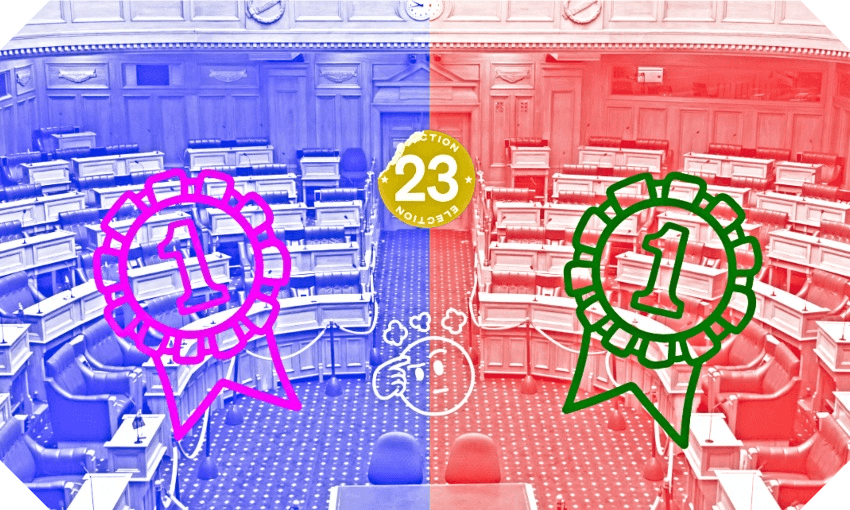The average across latest polls points to a tie of the blocs. What would happen then?
Unlikely, yes. Inconceivable, no. We already knew the election, now less than five months away, was shaping up to be close. But chuck the latest poll from Newshub in the mix, and add the National Party’s unequivocal ruling out of working with te Pāti Māori, and it could hardly be tighter.
Across the latest editions of five published polls, it looks like this:
Convert those percentages into seats in parliament (and assume, as is highly likely, that te Pāti Māori wins at least one electorate seat), and the National-Act combo comes in at 60. Unless there's an overhang (triggered when a party’s electorate seat outnumber their proportionate party vote allocation) that is exactly one half of the 120-seat house of representatives. The remaining three parties? Sixty seats.
Here we’re staring at not just a hung parliament, which is the norm under MMP, with 2020 the exception. More like superhung. Or, to use words less likely to upset the spam filters, a dead heat.
An unusual part of this equation is that the blocs look pretty well locked in. It hardly makes sense to call te Pāti Māori a “kingmaker” or holder of the balance of power when they’ve been so unambiguously ruled out by Christopher Luxon. No one who votes for Act or the Greens can have any doubt to which party their members will align.
Now, this is an average of a bunch of polls taken at a moment in time. The clear likelihood is they’ll fall one way or another in five months. And there is the chance of other parties in the mix, such as the Opportunities Party, which is genuinely open to working with each side, or the NZ First Party, which has ruled out working with Labour but, you know, things change.
(There is a solid case to increase the number of seats in the New Zealand parliament from 120 – and were that to happen, it should surely be expanded to an odd number, which could go some way to obviate the dead-heat scenario.)
But it’s far from impossible. Such a tie of the blocs would spring from the latest Talbot Mills poll, as it would from the average across five surveys. So let’s at least indulge the hypothesis. What would happen if this played out?
Were the numbers to land as they do in the scenario above, and there was no budging, no grand coalition, no shock governing deal between red and yellow or whatever? If no party could accordingly satisfy the governor general that it had the confidence of the house, would we be looking at another election to break the deadlock? I put that question to Andrew Geddis, professor of law at Otago University and human repository of electoral law knowledge.
"Yes," he said. "Note also that here the party hopping law could have real teeth – no individual MP could get carved off either bloc to support the other without then getting kicked out of parliament (ie the spectre of another Alamein Kopu cannot rise from the grave)."
There could be some room for manoeuvre on the part of TPM, Geddis added, "if they were to say something like 'we will abstain on confidence and supply because we aren't in the business of supporting any Crown government', thus allowing National/Act form a government. You don't need an absolute majority in the House, just more votes against a no confidence motion than for it.”
In that scenario, Geddis said, te Pāti Māori would hold considerable sway, in effect declaring: “Every single bit of government legislation put before the House will require the government to get us to say ‘yes’ to it – and we will only say ‘yes’ if we regard that legislation as being fully Treaty compliant. Govern under those conditions.”
But if there was no such way forward, if "no party leader is able to muster the support necessary to win a confidence vote", as Dame Patsy Reddy, then governor general, put it in a 2020 speech, "the question is then whether another election is required to resolve the situation. In that event, the incumbent prime pinister would be bound by the caretaker convention." (That convention urges restraint on the part of the caretaker government.)
Reddy continued: "Consequently, the governor general would expect the caretaker prime minister to consult other parties on any decision to advise the calling of another election, to ensure that the advice has the support of a majority of the House. It is the responsibility of the members of parliament to resolve matters so that the governor general is not required to consider dissolving parliament and calling an election without ministerial advice."
Follow our politics podcast Gone By Lunchtime on Apple Podcasts, Spotify or your favourite podcast app.





